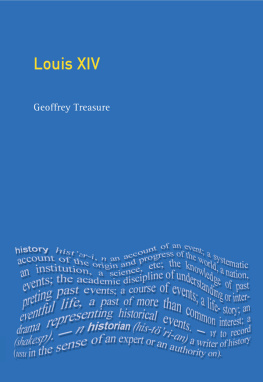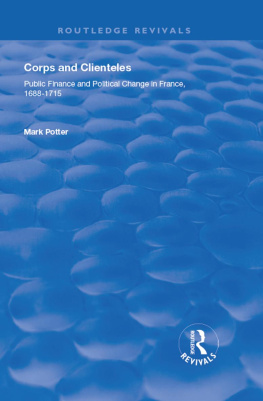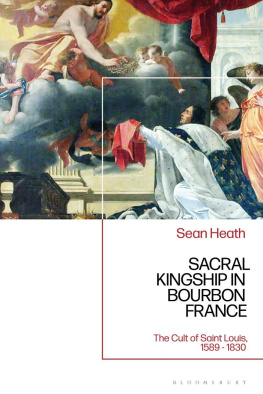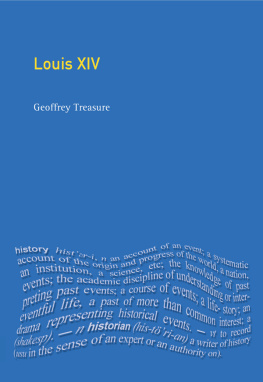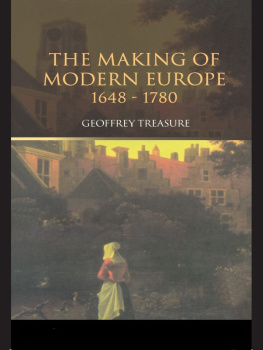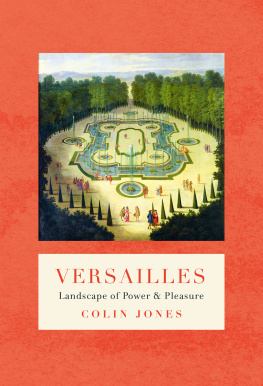First published 2001 by Pearson Education Limited
Published 2013 by Routledge
2 Park Square, Milton Park, Abingdon, Oxon OX14 4RN
711 Third Avenue, New York, NY 10017, USA
Routledge is an imprint of the Taylor & Francis Group, an informa business
Copyright 2001, Taylor & Francis.
The right of Geoffrey Treasure to be identified as Author of this Work has been asserted by him in accordance with the Copyright, Designs and Patents Act 1988.
All rights reserved. No part of this book may be reprinted or reproduced or utilised in any form or by any electronic, mechanical, or other means, now known or hereafter invented, including photocopying and recording, or in any information storage or retrieval system, without permission in writing from the publishers.
Notices
Knowledge and best practice in this field are constantly changing. As new research and experience broaden our understanding, changes in research methods, professional practices, or medical treatment may become necessary.
Practitioners and researchers must always rely on their own experience and knowledge in evaluating and using any information, methods, compounds, or experiments described herein. In using such information or methods they should be mindful of their own safety and the safety of others, including parties for whom they have a professional responsibility.
To the fullest extent of the law, neither the Publisher nor the authors, contributors, or editors, assume any liability for any injury and/or damage to persons or property as a matter of products liability, negligence or otherwise, or from any use or operation of any methods, products, instructions, or ideas contained in the material herein.
ISBN 13: 978-0-582-27958-2 (pbk)
British Library Cataloguing in Publication Data
A CIP catalogue record for this book can be obtained from the British Library
Library of Congress Cataloging in Publication Data
A CIP catalog record for this book can be obtained from the Library of Congress
Typeset in 11.5/14pt Garamond MT by Graphicraft Limited, Hong Kong

Majestic in conception, bold in ambition and splendid in image and ceremony, the monarchy of Louis XIV set standards and posed questions which have challenged us ever since. The reign of Louis XIV, boy and man, was also to be called the age of Louis XIV. During its seventy-two years there could be counted, among his contemporary sovereigns, three kings of Spain, three kings and one queen of Sweden, five kings and one queen of England (latterly Great Britain). Throughout the period, following the turbulence of mid-century, there was an unmistakable trend toward absolutist systems of government. Even in England and Holland, though exceptions to the trend, there was a marked increase in the powers of government and in the size of armies and navies. In these developments, contributing to the emergence of the modern state, France, by far the largest of European states, was the prime mover.
Louis XIVs reign was marred by several critical misjudgements. Whether for victory or for defeat, for glory, or even for the security which is now recognised to be the consistent aim of French policy, his subjects had to pay a high price. Without doubt his reign saw the enhancement of royal power, the extension of its authority in the provinces and, continuing the policy of the Cardinals, significant gains of territory. Stability can be seen to be the key note of the reign as the crown came to terms with its most privileged subjects and connived, where it could not coerce, in ways that might limit the power of royal agents to carry out constructive reforms but ensured a degree of consensus, along with a real enthusiasm for the rgime among those who counted most in the stakes of power, patronage and influence. How important that was can be gauged by comparison with the instability of the previous hundred years. Enough of the gains of earlier wars were held at the end to ensure the defensible frontier envisaged by the Cardinals in more dangerous times. This larger France, incorporating Alsace, Artois and much of Flanders, and also poised to take in Lorraine, commanded respect among the powers and enabled the ministers of Louis XV to negotiate from strength. At the same time the cultural hegemony of France is suggested by the general use of French as the language of diplomacy after 1714 and confirmed by the almost slavish imitation of French institutions in Germany, and admiration for French writers generally in the age of Enlightenment, Young people, wrote Leibnitz, come near to making Germany a tributary of French power.
In 1715 a tired old man might reflect on opportunities lost and on the family tragedies that meant another five-year old coming to the throne. But he could still hold his head high. He could be sure that there would be no repetition of the Fronde. He could not possibly have envisaged a more serious Revolution to come. Nor, by the longest stretch of the imagination, can we attribute to his style and conduct of government any responsibility for the collapse of what would be called the ancien rgime. That lies at the door of his successors. To consider the record of Louis XV and Louis XVI is of course to invite invidious comparison. But Louis hardly needs such support. He stands alone, not without faults, in many respects an ordinary man, but uniquely accomplished in the art and craft of kingship at a climactic time in the history of Europe. The main trends, political, intellectual and cultural, combined in one half century, and in one country, to make it possible. Louis XIV sensed the need and braced himself for the task. He was the man for the hour.
The mans stature is beyond doubt. Yet there is still room for a wide range of interpretation of the reign. At one extreme are those, mainly now French historians, who respond with enthusiasm to the rhetoric of the rgime, to grandeur and glory. They may hark back, perhaps with nostalgia, to a period when France was plainly predominant, when Germany was more of an idea than a state, before Britain had acquired trading supremacy and an overseas empire, before the appeal of French culture and the Cartesian rule of reason was qualified by the growing influence of English science and empirical philosophy. In that partisan spirit a recent expansive and justly lauded biography by a leading authority on the period can start by quoting with approval Voltaires salute to Louis XIV: Louis always had a sense of exaltation in his soul which drove him to great things. Bluche writes in a long tradition, his case reinforced by ample scholarship. He also writes scathingly of the denigrators, writers, teachers, intellectuals, all of them the posthumous, unintentional allies of Marlborough and William of Orange.
There is indeed a long tradition, whether British Whig in origin, stemming from naturally partisan Huguenot sources and from the hostility engendered by successive wars, or French republican in its influence on their textbooks, in which the king is portrayed as a despot and a bigot. Marxist historians have reinforced such views while at the same time reducing the role of the king by their main concentration on economy and society. Paradoxically, however, the most serious damage to Louiss reputation has been done by the numerous authors of the court, or romantic, school of biography, whether lost in admiration of the kings performance and of the supposed glamour of Versailles, or searching for scandal in the too well documented activities of his court. To this day there seems to be a market for this Versailles version: accepting too uncritically the propaganda of the rgime and focusing too narrowly on the court. Reacting strongly against such travesties, and with ever more research filling in the picture, British and American historians have found reason to scale down estimates of what Louiss absolutist government actually achieved, indeed to question the very notion of absolutism. While this has been a healthy corrective to inflated ideas it has left Louis in need of some rehabilitation. For the more we know about the limits and constraints on government, the more we recognise the values of seventeenth-century society and the ways in which the political process actually operated, the more impressive seems to be the achievement of the king and his ministers. I came to write this book after a study of Mazarin and the Fronde. I have ventured to enter a crowded field because I am convinced that there is need to strike a balance and to offer a study of the king and his power which is also because they should be inseparable a history of the country. There are several brief but scholarly analyses of the reign, of high value to the students for whom they are intended. There are also, as will be seen in my bibliography, important and revealing biographies of the king. I have sought the middle ground: in scale of treatment, balancing story and analysis, taking account of all that has been written, so profoundly and so well in some recent works, about French mentalities, institutions and values. It has been an exacting task and much has been pruned. I hope that the reader will find interest in the story of the king and some sense in my interpretation of the reign. Louis XIV was, by any standards an impressive human being, his kingship a sustained tour de force, the reign among the most important in the history of Europe. The very idea of kingship is coloured by our idea of this formidable exponent. He was not the state, but the state, in both idea and reality, was affected by the way he conceived and performed his role. A study of France in his time has to allow prime place to Louis XIV.

